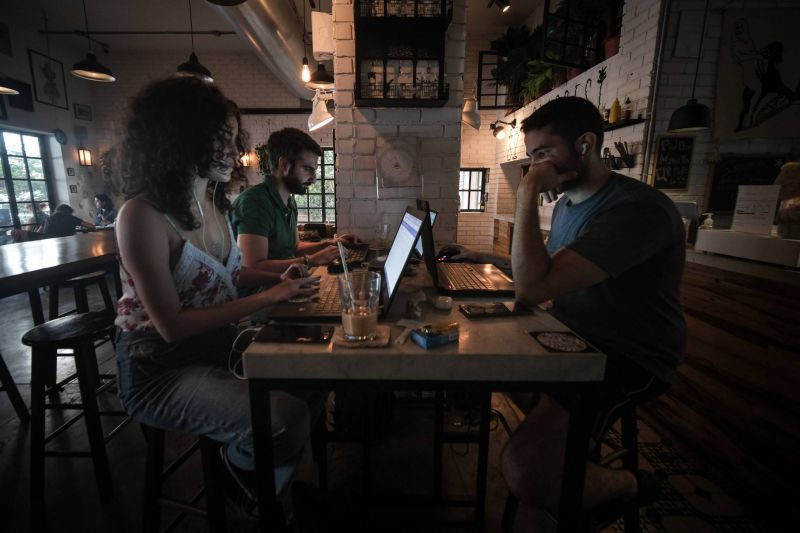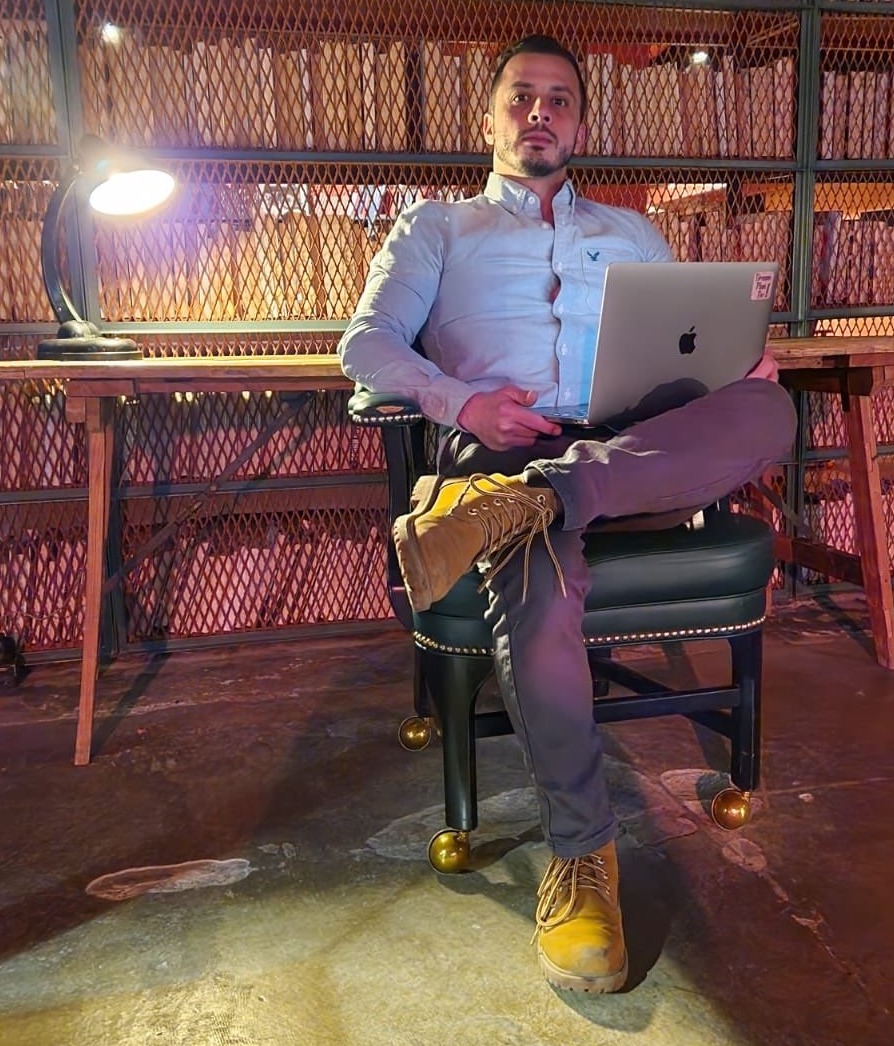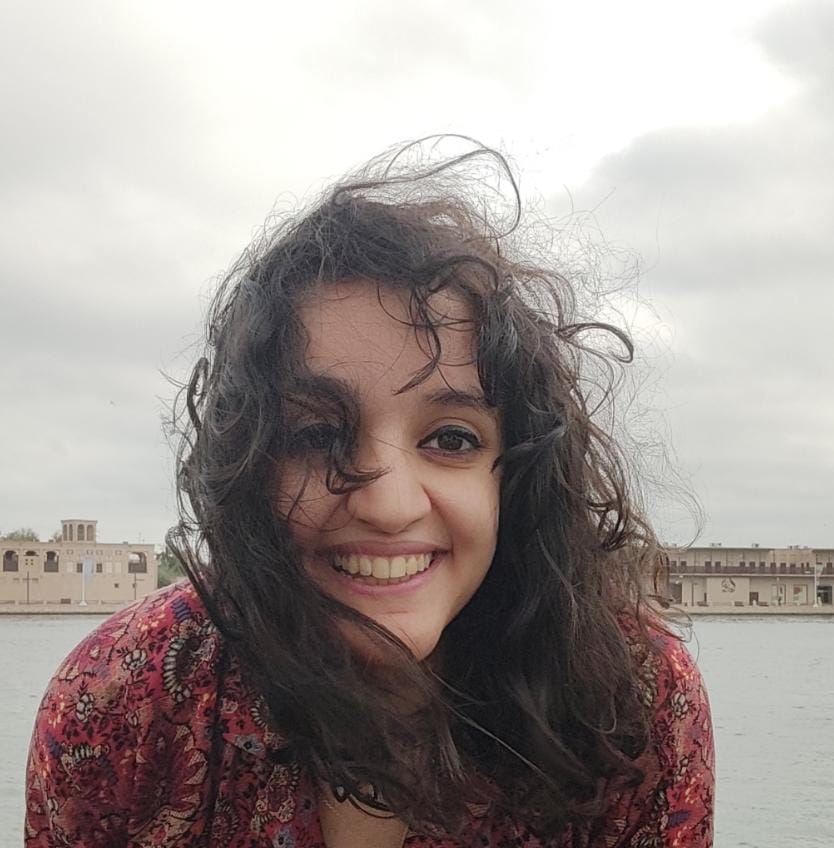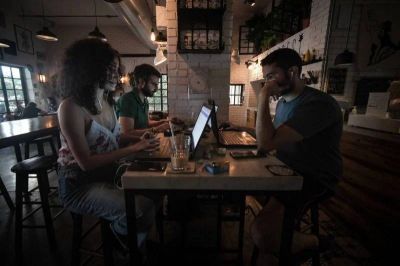
Remote workers operate from a coffee shop in Beirut, September 9th 2021 (Credit: João Sousa/L'Orient Today)
BEIRUT — These past years, with COVID-19 and the growth of remote work, the world witnessed the expansion of a new category of workers: the digital nomads.
They are usually young people, who “perform their occupation entirely over the internet while traveling,” as defined by the Merriam-Webster dictionary.
Some young Lebanese people are jumping on that bandwagon. Frustrated with the total collapse of Lebanese infrastructure, slow Internet and their dwindling wages — sometimes priced in the still depreciating Lebanese lira — they decided to take a leap and embrace the life of digital nomads.
L’Orient Today interviewed three of them to understand how they embraced this new life, and what they like — and dislike — about it.
Nour Atrissi, early 30s, senior project manager, Istanbul: “The day controls me in Lebanon; now I control my day”
Nour Atrissi started looking into leaving after the Aug. 4, 2020 explosion, but it took her 10 months to take the plunge.
She found a remote job at Pearson, a British-owned publishing company. “I just packed and left for Istanbul because as a Lebanese you get to stay there for three months without a visa,” Atrissi, who is in her early 30s, tells L’Orient Today.
“I was sucked into the day-to-day survival mode in Lebanon,” she says. “When I went to Istanbul and the infrastructure was secured, half of my energy and capacity that was being spent on irrelevant things [in Lebanon], was invested in my productivity.”
At first, Atrissi meant to stay in Istanbul only briefly “just for a breather,” she says. I looked more into it and realized that getting a tourist residency there is a fast and easy process and so I stayed,” she said.
Atrissi needed some time alone at the beginning.“I was recovering from Lebanon, I wanted to establish a certain lifestyle that had to align with my goals.”
But six months later she started wanting to meet people.
Now she works from a co-working space, because she likes to “keep building a professional network” and she likes to separate her work from her personal space. “Home is my place of rest,” she says, explaining that she works at least 10 hours a day.
“The day controls me in Lebanon, but now I control my day,” she says, explaining how in Lebanon the day is molded by electricity cuts.
But she does find it exhausting to keep doing everything over phone and video calls. Working remotely also takes more effort, she says, because it’s difficult to create bonds or read body language without communicating in person.
In order to meet new people and build a social circle, she started going to language exchange events for internationals who live in Istanbul.
“I knew at least two Lebanese people here and they know some people so the circle grew,” she says.
She goes to trivia nights, quiz nights and to other coworking spaces, to grow her network.
Atrissi likes how, in Turkey, nature is accessible, contrary to Lebanon where it is privatized or not maintained. She also appreciates how local flights make it easy to change scenery without leaving the country: “Your mental health really improves here,” she says. “People here are close to each other and their hospitality is similar to Lebanon.”
Whenever she feels homesick, she knows that “Lebanon is just one affordable plane ticket away,” she says. “ It’s easier to stay in touch because of the geographic proximity of the two countries.”
When asked whether she would recommend the digital nomad lifestyle to fellow Lebanese, Atrissi answers: “It depends on how fed up you are, on what you are looking for. If you are able to work, generate income, have [a decent] infrastructure then it might be manageable [to stay in Lebanon]. But I would recommend getting a breather, a better perspective.”
“You hit a certain wall in Lebanon,” she says. And even though she would still choose to live abroad, she still feels that “there’s no place like home and there’s no city like Beirut.”
Mohammed Ghali, 35, freelance public relations and marketing specialist, Tblilisi: “When you live in Tbilisi, it's easy to meet new people”
 (Credit: Image courtesy of Mohammed Ghali)
(Credit: Image courtesy of Mohammed Ghali)
In 2020, “I was in Thailand working as a freediving instructor,” explains Mohammed Ghali. “ I was trying to work online as a marketing and PR practitioner. Through my travels I met a lot of digital nomads who were creating an online career which inspired me to look into it,” Ghali told L’Orient Today.
“I wanted freedom and independence. During the pandemic I had to go back to Lebanon where there isn’t electricity, wifi or any proper essentials that a person needs to work online,” he noted.
Ghali started researching places that Lebanese people could go to without a visa, that also had electricity, proper internet service, and where rent and the general standard of living were affordable, because he knew he had to kickstart his career.
“I landed in Tbilisi [in 2021] and decided to take it from there,” says Ghali, who is now working with companies in Singapore, Saudi Arabia and the United Arab Emirates.
Ghali works four days a week, and is trying to work on his work-life balance.
“I wake up each morning, have my coffee and then get to work by around 9 a.m. I work for a few hours, and then take a midday break before resuming till around 5 p.m. and then I go out with friends or do whatever I want with my day,” he said.
“There are some weeks where I work for more than four days but I try to meet my deadlines in those four days,” he says.
Ghali says this is the lifestyle he always wanted: one that gives him the freedom and space to live at his own pace.
“I recommend Tbilisi for digital nomads who are planning on earning a foreign income, but I have to warn that a language barrier exists, as locals speak mainly Georgian and Russian,” he noted.
“I work from home and from a coworking space to change the environment and scenery at times,” he says.
It’s easy to meet new people in Tbilisi, he explained, noting that he met people at cafes and bars. “When you meet one friend you’ll meet another, and that’s how you start slowly building your network.”
He explains that Tbilisi has a large digital nomad community and one can meet people through Facebook groups for expats and internationals residing in Georgia, and that there are many events that happen here for foreigners and newcomers.
“There's a huge Lebanese population who have bars, restaurants, cafes. When you go to one you’ll start meeting people. Lebanese here are super friendly and hospitable to newcomers,” Ghali concluded.
Nourhane Mokahal, freelance consultant, Dubai: “When you start being a digital nomad, it’s up to you to create a work-life balance”
 (Credit: Image courtesy of Nourhane Mokahal)
(Credit: Image courtesy of Nourhane Mokahal)
Born and raised in Lebanon, 28-year-old Nourhane Moklahal moved to Dubai in December 2021. She says that her move did not come as a reaction to the crisis that has hit the country, but because she wanted to explore a new country that is outside her comfort zone.
“I had some savings, I wanted a place where I could explore myself, and at some point in Lebanon you can't grow, the problems are recurring, you end up doing the exact same thing over and over again,” she explains.
“I wanted a legitimate foundation and didn't want to worry about those small things: water, electricity. I also didn't want to learn a new language. I found out that getting a tourist visa [for the UAE] is very easy, and I have friends there so the [country] seemed like a good fit.”
She explained that when you live in Dubai you live a life full of legal and personal safety, as there is a solid and evenly enforced legal framework in place.
“Being based in a country that is a member of the Gulf Cooperation Council opens opportunities to work for GCC companies, whose rate of payment is even higher than that of Europe,” she explains. “I worked on my Linkedin a lot: When you put that you are based in Dubai on your profile, it’s easier for companies to find you. I currently work for companies in Saudi Arabia, France, Lebanon and the UAE,” she says, noting however that she still works as a freelance project manager for the social enterprise she worked for in Lebanon. “We support social and green entrepreneurs to [grow] their ideas. ”
“There are a lot of opportunities but it's competitive because there are a lot of competent people living here, so it is an opportunity for you to continue working on yourself and your skills,” she says, of life in Dubai.
She warns however that the cost of living in Dubai is high, and that “you need to work a lot on your financial management skills.”
“When you start being a digital nomad, it’s up to you to create a work-life balance and think about your own upcoming projects. Life here is very fast-paced so you need to be careful,” she says.
Kahal works both from home and from a coworking space, where she goes when she wants to “meet new people.” She adds that “Just being out there is good for my mental health.”
She also made sure to have a healthy routine outside of work: “There is an application called Meetup, so I joined people through it on different hikes. I also joined a community gardening group … where you meet people and do something for the community. I volunteered twice in a beach cleanup, and facilitated workshops in cultural and art events,” she explains.
What she appreciates about Dubai is that she is not constantly running all over the place, contrary to Lebanon. “Every morning for breakfast I slow down for half an hour, I sit and eat, which is something I could never do when I was in Lebanon,” says the young woman, who starts her day by journaling.
When asked what advice she would give to prospective digital nomads, she recommends visiting the country they plan on working from for a short period of time before fully relocating to it.
